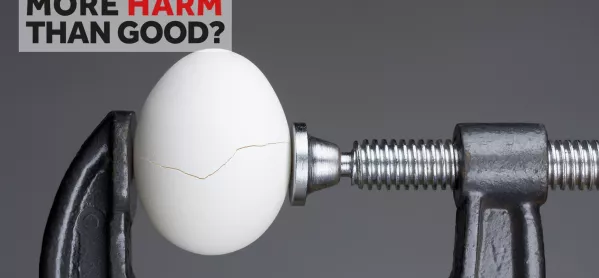- Home
- Exclusive: Schools campaign to end ‘immoral’ Sats pressure
Exclusive: Schools campaign to end ‘immoral’ Sats pressure

Schools are being drawn to a campaign that calls on them to put the interests of children above the pressures of the accountability system.
Primary head Jon Le Fevre wants school leaders to sign a charter which commits to not putting too much pressure on children to pass Sats, especially in Year 6.
He says 50 schools and organisations have already expressed an interest, with the campaign yet to officially launch.
“Headteachers are in this job for the right reasons but people have expressed their feeling that the accountability system is making schools act in a way that prioritises the Sats outcomes and maybe not in the best interests of the children,” Mr Le Fevre, head at Pilgrims Cross CE Primary School in Andover told Tes.
“Teachers feel that their data plays a big role in determining their Ofsted inspection. If this was different, these immoral practices might stop.
“The problem is that many heads will feel that because everyone is doing it, I have to do it. Some schools are doing so much work to boost their Sats scores they daren’t stop doing any of it because they don’t know what is making a difference.”
His campaign comes as the NAHT heads’ union commission on accountability warns that the current system of Ofsted, league tables and targets is doing more harm than good.
The new commission report published today says that pressure to perform well in tests is skewing schools’ decision-making and narrowing the curriculum.
Mr Le Fevre has previously worked as an infant school head and is experiencing key stage 2 Sats for the first time.
He told Tes he had been shocked at the lengths some schools were going to in order to boost their KS2 Sats scores.
He warned that the pressure of the school accountability system was leading to schools behaving in ways that were not in the interests of their pupils.
‘Full Sats papers as homework’
“I started talking to people about what happens in Year 6 and I was shocked at what schools are doing to prepare for Sats,” the head said.
“Schools are significantly narrowing the curriculum in Year 6 from Christmas or before; they are putting on revision classes in the holidays, running booster classes, sending home full Sats papers as homework.”
Mr Le Fevre is now looking for schools who want to change this culture.
He is part of a new group called Assessment for Children, which is looking to produce a charter for schools to sign up to.
He has been in talks with the NEU, NAHT and More than a Score campaign group and says many schools are interested.
The charter, which is being developed, is set ask schools to sign up to a series of commitments such as:
* Running a broad and balanced curriculum and not to narrow this in KS2 or Year 6;
* Not to run any extra Sats booster classes, or holiday clubs;
* Recognising that Sats are used as a predictor for GCSEs and ensure that pupils leave primary school with results which accurately reflect their ability;
* Prioritising children’s personal growtlong-termerm development, engagement as learners and their wellbeing over Sats scores.
Nick Brook, the NAHT’s deputy general secretary and chair of the Accountability Commission, said: “We really welcome what Jon has been doing. It embodies the findings of the commission and it is exactly what we want to see - school leaders taking responsibility to ensure they make the right decisions in the interests of the pupils and communities they serve, rather than being driven by the pressures of the accountability system.”
Mr Le Fevre argues that schools seeking to boost their KS2 scores are distorting the entire system by creating perverse incentives for schools to do less well at KS1. He says it also means secondary schools will be judged from a baseline that is artificially high.
“I’ve heard that schools are capping their key stage 1 results and restricting the number of level three/ greater depth judgements they give to Year 2 pupils so the progress in key stage 2 looks stronger,” he says.
Mr Le Fevre added: “We wanted to set up a group who would agree together what the Year 6 curriculum will look like and agree to not narrow the curriculum and make sure all decisions about Year 6 are in the best interest of children. And we will be publishing such a charter soon.”
Keep reading for just £1 per month
You've reached your limit of free articles this month. Subscribe for £1 per month for three months and get:
- Unlimited access to all Tes magazine content
- Exclusive subscriber-only stories
- Award-winning email newsletters



